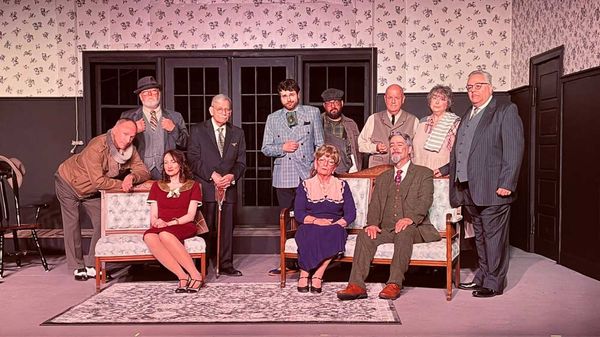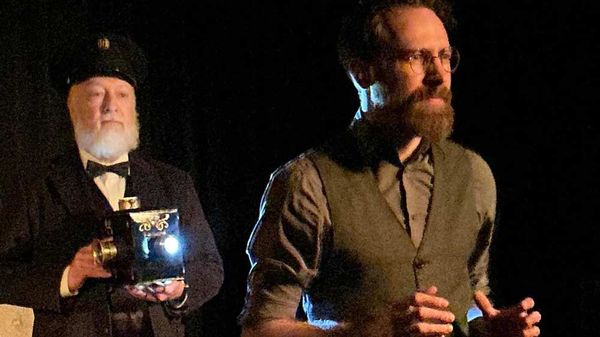September 12, 2012
The Train Driver
Joseph Pisano READ TIME: 3 MIN.
The Signature Theatre concludes a triptych of Athol Fugard productions with "The Train Driver," the South African playwright's most recent work on the subject of his troubled homeland. Like the two previously staged selections in the series, "Blood Knot" and "My Children! My Africa!," "The Train Driver" offers a ground's-eye view of South Africa's painful racial realities.
But unlike its companion pieces, which premiered, respectively, in 1961 and 1989, "The Train Driver" is about post-apartheid South Africa, a reformed country where the great battle against racial injustice has been won, but, nevertheless, the casualties are still mounting.
The literary conscience of South Africa for more than a half-century, the staunchly anti-apartheid Fugard has never been sentimental while dramatizing his personal convictions, which is why his plays are not just admirable polemics. A master of both the authentic and the poetic, Fugard populates his stories with achingly human characters who, whether on the side of the angels or not, are capable of making wrong-headed, if not outright despicable, choices, as they struggle to make sense of, and respond to, the social insanity that surrounds them.
And even though apartheid, the easiest South African problem to see and therefore attack, may have officially ended nearly two decades ago, with "The Train Driver" Fugard continues to shun any triumphant proclamations about a nation that continues to be deeply fractured along racial lines.
The play's basic structure belies its intellectual complexity, which subtly accrues over its 90-minute run time. As with "Blood Knot," Fugard also directs "The Train Driver," offering bookended visions of early-apartheid and post-apartheid South Africa that are equally bleak and, thus, in juxtaposition, exponentially more disheartening. Others may try to bury apartheid in the past and a rhetoric of change, but not Fugard, who cannot ignore the iniquitous system's festering aftereffects.
Both "Blood Knot" and "The Train Driver" are two-handers in which race is all-defining. But whereas the former play is about a pair of brothers whose drastically different skin tones, in effect, turns them into strangers, the latter concerns two men who have nothing in common but their country. Narrated by Simon Hanabe (Leon Addison Brown), a limping old African gravedigger, "The Train Driver" is not really his story but, rather, belongs to Roelf Visagie (Ritchie Coster), a guilt-ridden Afrikaner whose life is in a tailspin because of a horrific event.
Initially, Fugard's unbalanced treatment of the characters is curious, until one realizes that it is, in fact, a very clever, and telling, indictment of the shortsightedness that might cause an audience to care more about Roelf's feelings than Simon's.
On a godforsaken strip of veld (rendered with pitch-perfect despair by scenic designer Christopher H. Barreca), Simon buries the "nameless" dead under mounds of sand marked by whatever debris -- a broken hubcap, a milk jug -- happens to be at hand. One could judge the symbolism of this cemetery-cum-trash dump, where unclaimed black corpses are interred, as a bit over-the-top, if places like it did not actually exist.
Bedraggled, exhausted and somewhat crazed, Roelf stumbles across Simon while looking for the graves of a young mother and her baby. Although he does not know them, he unintentionally helped to put them in the ground. The suicidal woman stepped in front of the train he was driving, her baby strapped to her back.
No one holds Roelf accountable for their deaths, legally or morally, but still he cannot grant himself absolution. Overwhelmed by feelings of grief and anger for the deceased woman who haunts his dreams, he has come to the graveyard, located on the outskirts of Port Elizabeth, to scream obscenities at his imagined tormentor's moldering body. But, after a few one-sided conversations with Simon, his intentions become less acrid and far more grandiose.
As Roelf lays bare his soul, in several extended monologues, Simon either sleeps soundly in his shanty or politely listens, an enigmatic smile frozen on his face. Meaningless death is nothing new for the gravedigger, who Roelf presumptuously upbraids for his supposed callousness, which includes not placing proper crosses on the plots or remembering who is in them.
Coster is stellar as the volatile Roelf, delivering Fugard's challenging, exposition-laden text with naturalistic grace and assuredness. As for Brown, he mostly disappears into the background, helping Fugard to convince the audience that they are watching a straightforward parable about reconciliation and redemption.
While Brown, as much a marvel of restraint as Coster is a cauldron of emotion, occasionally hints at Fugard's end game, he does not fully reveal it until uttering the devastatingly simple line that concludes the play. Through Simon's exasperated final words, Fugard offers a stark reminder that there is no earthly way to help the dead, so we might as well turn our attention to the living--all of the living.
Joseph Pisano is a freelance writer living in New York.







